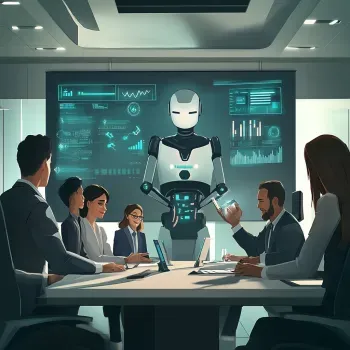Peak Demand Blog

Is AI Taking Our Jobs? Top 3 Myths Debunked
Is AI Taking Our Jobs? Debunking the Myths

Introduction: The Anxiety Around AI and Job Loss
In recent years, artificial intelligence (AI) has become a topic of both fascination and fear. From sci-fi movies to headlines warning us that machines are taking over, it seems like we’re constantly hearing that AI will replace human jobs, leaving millions of people unemployed. But is that really the case? At Peak Demand digital agency, we work closely with AI systems and understand their impact on industries, workers, and jobs. And the truth is a lot more nuanced than the doomsday predictions.
Let’s break down some of the biggest myths about AI and jobs and see how it’s actually shaping the future of work.
Myth 1: AI Will Replace All Human Jobs

Perhaps the most widespread fear is that AI will replace human jobs entirely, leaving people without work. This idea comes from the fact that AI is excellent at performing repetitive, routine tasks—things like data entry, answering basic customer queries, or sorting through large amounts of information. So, it's easy to assume that robots and algorithms will eventually do everything humans do, but faster and cheaper.
However, this assumption overlooks an important fact: many jobs require creativity, emotional intelligence, and complex problem-solving—areas where AI still struggles. Think of roles like therapists, teachers, and social workers. While AI can assist in these fields, it’s not capable of understanding human emotions and providing empathy in the way a person can.
Example: In customer service, AI chatbots can answer straightforward questions like “Where’s my package?” or “What are your business hours?” But when a frustrated customer calls in to resolve a complicated billing issue, or an irate shopper wants to speak with someone about their order being late, AI isn’t equipped to handle the human side of that conversation. These situations require empathy, negotiation, and active listening—skills that are still very much human.
The StatCan report highlights that while many jobs are exposed to AI, not all are equally impacted. For example, professionals in business and finance may see AI automating parts of their jobs, but it’s unlikely to eliminate them entirely. Instead, AI is more likely to handle administrative tasks, leaving the human workers to focus on complex decision-making and client relations.
Myth 2: AI Is Only for Big Corporations

There’s a common belief that AI is only useful for massive companies like Google, Amazon, or Apple—businesses with huge budgets and teams of experts who can build and maintain complex AI systems. But this couldn’t be further from the truth. AI has become a lot more accessible, even for smaller businesses, and it’s not just for the tech giants anymore.
Thanks to advancements in cloud-based AI services and user-friendly AI tools, businesses of all sizes can tap into AI to improve how they operate. You no longer need a team of data scientists to integrate AI into your business. Services like Google Cloud AI or Microsoft’s Azure AI make it easy for companies to use AI tools for everyday tasks. These tools can help businesses automate marketing, improve customer service, and manage inventory, all without a massive investment in technology or personnel.
Example: Imagine a small neighborhood coffee shop. The owner may want to improve how they interact with customers, but hiring a full-time customer service rep may be out of budget. Instead, they can use an AI-powered chatbot on their website that answers common questions, takes orders, and even recommends menu items based on past purchases. This way, the coffee shop can provide quick and efficient service while the owner focuses on other aspects of the business.
Another example could be a small clothing retailer. They may not have the budget to hire a full marketing team, but with AI-powered tools like email marketing automation or AI-driven social media insights, they can create targeted campaigns that are personalized for each customer based on their shopping habits. This makes the company feel like it’s running a big marketing department when it’s really just one or two people using smart AI tools.
At Peak Demand, we’ve seen firsthand how smaller companies can use AI to level the playing field. It’s no longer just for large corporations. AI is affordable and accessible for businesses of all sizes, helping them run more efficiently and compete with bigger players. Whether it’s automating routine tasks, improving customer interactions, or using data insights to make smarter decisions, AI is making life easier for small and medium-sized businesses every day.
In short, AI isn’t just for the big guys anymore—it’s for everyone.
Myth 3: AI Doesn’t Create Jobs—It Only Destroys Them

A lot of people think AI is just here to take jobs and leave everyone unemployed. It’s an understandable fear, especially with all the talk about automation replacing workers. But this idea doesn’t consider the new opportunities that AI is creating, especially in jobs that didn’t even exist a few years ago.
When we think about AI, we often focus on the tasks it can automate, like data entry or answering simple customer questions. But we rarely talk about the new jobs AI creates—jobs like AI trainers, data analysts, and AI ethicists. These roles are essential to making sure AI systems are running smoothly, that they’re fair, and that they actually benefit businesses and people.
Example: Think about the role of an AI trainer. These are the people who “teach” AI systems by feeding them the right data and helping them learn how to make better decisions. Then there’s the AI ethicist, a newer job that ensures AI systems are being used responsibly, considering privacy concerns and avoiding bias. These are jobs that didn’t exist 10 or 15 years ago, and they’re becoming more important as AI evolves.
In fields like healthcare, AI is working alongside doctors to analyze medical data faster than ever before. While the AI can suggest potential diagnoses, it’s still the doctor’s expertise that makes the final call. So, AI isn’t replacing healthcare jobs—it’s helping medical professionals work more efficiently and focus on patient care.
Even in industries like marketing, where AI can help automate email campaigns or analyze consumer behavior, you still need human creativity. AI can gather the data, but it’s up to a human marketing strategist to craft a compelling story that resonates with customers. In this way, AI is more of a partner than a replacement.
At Peak Demand, we’ve seen how businesses are using AI to enhance their workforce rather than replace it. AI handles the routine, repetitive tasks, freeing up human workers to focus on the things that really matter—like creativity, problem-solving, and building relationships.
In short, AI isn’t just taking jobs—it’s changing the nature of work and creating new opportunities that didn’t exist before.
The Reality: AI is Changing Jobs, Not Replacing Them Completely

So, what’s the reality of AI’s impact on jobs? It’s not about AI taking over everything—it’s about transforming how we work. AI is especially good at handling repetitive tasks and processing large volumes of data, freeing up workers to focus on more complex, creative, or strategic aspects of their roles.
According to StatCan, nearly 40% of workers in Canada are in jobs with low exposure to AI automation. Meanwhile, many of the jobs that are "highly exposed" to AI are also jobs that can benefit the most from AI's assistance. For instance, teachers are using AI to personalize learning experiences for students, and finance professionals are using AI to analyze market trends.
This shift doesn’t mean the end of jobs—it means jobs are evolving. Workers in industries ranging from education to finance are learning to use AI tools to amplify their work. Instead of spending time on data entry, they can focus on creative problem-solving, decision-making, or strategy.
Example: In manufacturing, AI-powered robots can handle dangerous or repetitive tasks, like assembling parts or sorting materials. This doesn’t mean human workers are no longer needed. Instead, factory workers are shifting to roles where they oversee these machines, maintain them, or solve more complex issues when the machines encounter problems.
Conclusion: AI is a Tool, Not a Threat

So, is AI really coming for your job? The answer isn’t as black and white as the headlines make it seem. AI is transforming jobs, but it's not wiping them out entirely. Many industries and professions are finding ways to integrate AI to enhance what they do, not replace it.
At Peak Demand, we believe that AI should be viewed as a tool that helps both businesses and employees thrive. By understanding how AI can complement human skills—whether in customer service, healthcare, or finance—workers can embrace the opportunities that come with this new technology. The key is learning to adapt to these changes and harness AI's potential to make work better, not more difficult.
The future of work isn’t one where AI replaces us; it's one where we work alongside AI to achieve greater results, improve efficiency, and unlock new opportunities.
Learn more about the technology we employ.
Watch Video of AI Use Cases on our Youtube Channel

Frequently Asked Questions About AI Taking Human Jobs
Will AI replace all human jobs?
No, AI is not expected to replace all human jobs. While AI can handle routine, repetitive tasks like data entry and answering basic customer queries, many jobs require human skills like creativity, emotional intelligence, and complex problem-solving—areas where AI struggles. Roles such as therapists, teachers, and social workers rely heavily on human empathy and understanding, which AI cannot replicate.
How is AI impacting job roles in business and finance?
In fields like business and finance, AI is often used to handle administrative tasks, such as organizing data or automating certain processes. However, this doesn’t mean AI is replacing workers in these fields. Instead, it allows human professionals to focus on more complex decision-making, client relations, and strategic planning. AI becomes a tool that assists rather than replaces.
Is AI only useful for large corporations?
No, AI is not just for big companies like Google or Amazon. Thanks to advancements in cloud-based AI services and user-friendly tools, small and medium-sized businesses (SMEs) can also benefit from AI. For example, small businesses can use AI to automate customer service, manage marketing campaigns, or handle inventory—allowing them to compete with larger players without needing a huge budget or technical team.
How can small businesses use AI effectively?
Small businesses can use AI in various ways to improve efficiency and customer service. For instance, a small coffee shop might use an AI-powered chatbot to answer customer questions, take orders, or recommend menu items based on previous purchases. Similarly, a small clothing retailer might use AI tools to personalize marketing campaigns or optimize inventory management.
Does AI create new job opportunities?
Yes, AI does create new job opportunities. While AI may automate certain tasks, it also creates roles that didn’t exist before, like AI trainers, data analysts, and AI ethicists. These jobs are crucial for ensuring AI systems function properly and are used responsibly. AI is not just taking jobs—it’s transforming the job market and creating new opportunities for workers.
What kinds of jobs has AI created?
AI has created roles in areas such as machine learning, data science, and AI ethics. For example, an AI trainer helps AI systems learn by feeding them data and refining their performance. AI ethicists ensure that AI technologies are used ethically, avoiding bias and respecting privacy. These jobs didn’t exist 10 years ago but are now becoming increasingly important as AI continues to grow.
How is AI impacting industries like healthcare?
In healthcare, AI is assisting professionals by analyzing large amounts of medical data more quickly than a human can. This helps doctors make more accurate diagnoses and spend more time focusing on patient care. While AI can suggest potential diagnoses based on data, it’s still the doctor’s expertise that leads to the final decision. AI helps healthcare workers be more efficient, rather than replacing them.
Can AI be used in creative industries like marketing?
Yes, AI is becoming a powerful tool in creative industries like marketing. AI can analyze consumer behavior, automate email campaigns, and track marketing performance. However, the human creativity behind campaigns—coming up with compelling messages and storytelling—still requires human insight and innovation. AI gathers data, but humans craft the story.
How does AI affect job roles in manufacturing?
In manufacturing, AI-powered robots often take over dangerous or repetitive tasks, such as assembling parts or managing inventory. But this doesn’t mean human workers are no longer needed. Instead, workers are shifting into roles where they oversee these machines, troubleshoot issues, or handle more complex tasks that require human judgment.
Is AI a threat to jobs or an opportunity for growth?
AI is more of an opportunity for growth than a threat to jobs. It allows workers to focus on higher-level tasks by taking over repetitive work. Instead of eliminating jobs, AI is transforming them. Workers in various industries, from finance to education, are learning to use AI to enhance their roles, making their work more creative, efficient, and impactful.
How does AI impact highly educated workers?
According to the StatCan report, highly educated workers are more likely to have jobs that are complementary to AI, meaning they can benefit from AI assistance. For example, workers in management, education, or healthcare can use AI to assist with data analysis or routine tasks, allowing them to focus on more strategic, creative, or personal interactions. AI enhances their ability to work more efficiently rather than replacing their roles.
What are the top industries where AI is having the most impact?
AI is having a major impact on industries such as finance, healthcare, manufacturing, and education. In finance, AI helps with fraud detection and market analysis. In healthcare, it assists doctors with diagnostics. In manufacturing, AI-powered machines take over repetitive tasks, while in education, AI helps teachers personalize learning experiences for students.
Is AI affecting low-skilled jobs more than high-skilled jobs?
AI is generally more likely to impact low-skilled, routine jobs that involve repetitive tasks, such as data entry or simple customer service queries. However, highly skilled workers in fields like data analysis or finance may also see their roles transformed by AI, as it can take over routine aspects of their jobs, allowing them to focus on more strategic, high-level tasks.
How should businesses and workers prepare for AI’s impact on jobs?
Businesses and workers can prepare by embracing AI as a tool rather than seeing it as a threat. Workers should focus on upskilling—learning how to work with AI technologies to enhance their roles. Businesses should invest in AI solutions that complement their employees’ skills and improve efficiency without sacrificing creativity or human interaction.
How can AI help businesses of all sizes compete?
AI allows businesses of all sizes to level the playing field. For smaller businesses, AI-powered tools can automate time-consuming tasks like marketing or customer service, allowing them to operate more efficiently without needing a large workforce. This enables small businesses to compete with larger corporations by leveraging AI to improve productivity and decision-making.
Peak Demand CA on LinkedIn
@PeakDemandCa on X (Twitter)
@PeakDemandCanada on Facebook
@PeakDemandCanada on Instagram
@PeakDemandCanada on Youtube
Copyright © 2025 Peak Demand - All rights reserved.
This Website is Powered By and Built On Peak Demand

